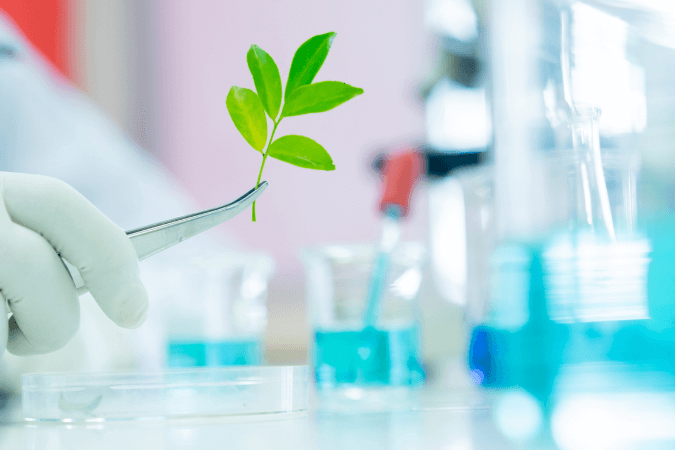Karina:
Hi, Mike. How's it going?
Mike:
Actually, I was up last night with an assignment so - yeah, I'm tired, but I guess we'd better sort this presentation out.
Karina:
Well, we've done enough background reading, but I think we need to organise exactly what we're going to say about biofuels during the presentation, and the order.
Mike:
I thought we could start by asking our audience what car engines were first designed to run on - fossil fuels or biofuels.
Mike:
Yes, when most people think about cars and fuel, they think about all the carbon dioxide that's produced, but they don't realise that that wasn't always the case.
Karina:
You're probably right. The earliest car engines ran on fuel made from corn and peanut oil, didn't they?
Mike:
Yes. The manufacturers used the corn and peanut oil and turned them into a kind of very pure alcohol.
Karina:
You mean ethanol?
Mike:
Yes. In fact, most biofuels are still based on ethanol. Actually, I've got some notes here about the process of turning plant-matter into ethanol - the chemical reactions and the fermentation stages and...
Karina:
It's interesting - the other students would appreciate it, but different biofuels use different processes and if we give a general description, there's a risk we'll get it wrong, and then the tutor might mark us down. I'd rather we focus on the environmental issues.
Mike:
Fair enough. So, um - the main plants that are used for biofuel production now are sugar cane, corn...
Karina:
And canola. Of all of them, canola is probably the least harmful because machines that use it don't produce as much carbon monoxide.
Mike:
Sugar cane seems to be controversial. It doesn’t require as much fertilizer as corn does to grow, but when they burn the sugar cane fields, that releases loads of greenhouse gases.
Karina:
Yes, but some critics have suggested that the production of corn ethanol uses up more fossil fuel energy than the biofuel energy it eventually produces. For that reason. I'd say it was more harmful to the environment.
Mike:
I see what you mean. You're probably right. It's interesting how everyone saw the biofuel industry as the answer to our energy problems, but in some ways, biofuels have created new problems.
Karina:
Well, in the USA. I wouldn't say that farmers are having problems - the biofuel industry for them has turned out to be really profitable.
Mike:
I think, though, that even in the USA, ethanol is still only used as an additive to gasoline, or petrol. The problem is that it still has to be transported by trucks or rail because they haven't built any pipelines to move it. Once they do. it'll be cheaper and the industry might move forward.
Karina:
That'll have to happen one day. At least the government are in favour of biofuel development
Mike:
Yes. But Brazil's probably in the lead as far as biofuels are concerned - they've got to the point where they don't need to import any oil now.
Karina:
Which is great, and the industry in Brazil employs a huge number of people, but is it sustainable? I mean, as the population grows, and there are more vehicles on the roads and there's more machinery, surely they can't depend so much on sugar cane?
Karina:
At some point, there has to be a limit on how much land can be used for sugar cane production - certainly if you want to preserve natural habitats and native wildlife.
Mike:
I think that whatever problems Brazil's facing now - the same will be true for any country - you have to weigh up the pros and corns.
Karina:
Well, we probably won't see an increase in biofuel use - I mean, they won't replace fossil fuels until we can find ways to produce them cheaply and quickly and with less cost to the environment.
Mike:
... making sure they require minimal energy to produce.
Karina:
Exactly. And in a way that means they have to cost less than fossil fuels - certainly when you're filling up your car.
Mike:
Yes, and whatever other kind of engines use fossil fuels at the moment.
Karina:
Alright, so in the last section of the presentation, what problems are we focusing on?
Mike:
Well, we've already had a look at different types of pollution in the first section, so we can leave that out, but the biggest issue related to biofuels is that land is now being used to grow biofuels crops - and that's contributing to global hunger.
Karina:
Indeed. It doesn't seem right we're using corn to run cars when people can't afford to buy it to eat. Yes, let's talk about that. The other thing is that in some countries, the way that biofuel crops are grown and harvested still produces a great deal of pollution - really damaging to the atmosphere
Mike:
OK, that's definitely an issue we should look at.
Karina:
Let’s not finish on a negative note, though. Why don’t we talk about the potential new sources of biofuel - so rather than corn and sugar cane - what other plants could be used?
Mike:
Good. Some companies are exploring the possibility of using wood, and seeing how that can be used to make ethanol.
Karina:
Yes, and algae is another possibility. You can grow it in any water and it absorbs pollutants, too.
Mike:
I read that. And grasses. They're another plant that researchers are investigating as a biofuel.
Karina:
And these kind of plants aren’t used as food, which is why …
 Mike nói là '' I thought we could start by asking our audience what car engines were first designed to run on - fossil fuels or biofuels.''
Mike nói là '' I thought we could start by asking our audience what car engines were first designed to run on - fossil fuels or biofuels.''  Sau đó, khi Karina hỏi ''The earliest car engines ran on fuel made from corn and peanut oil, didn't they?'' thì Mike trả lời là "Yes"
Sau đó, khi Karina hỏi ''The earliest car engines ran on fuel made from corn and peanut oil, didn't they?'' thì Mike trả lời là "Yes"


